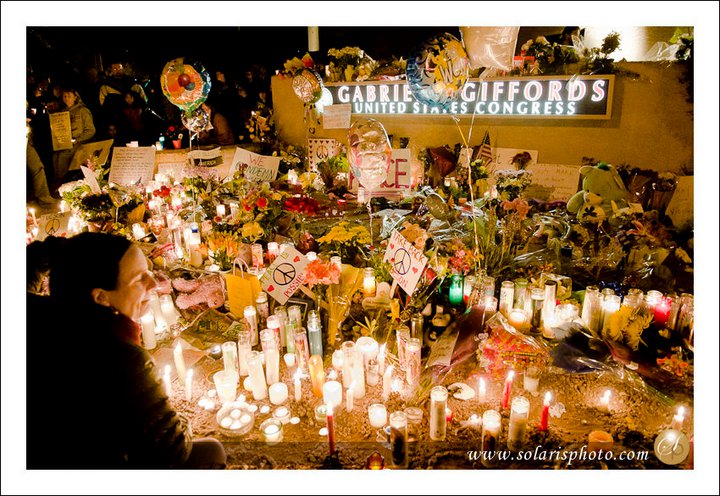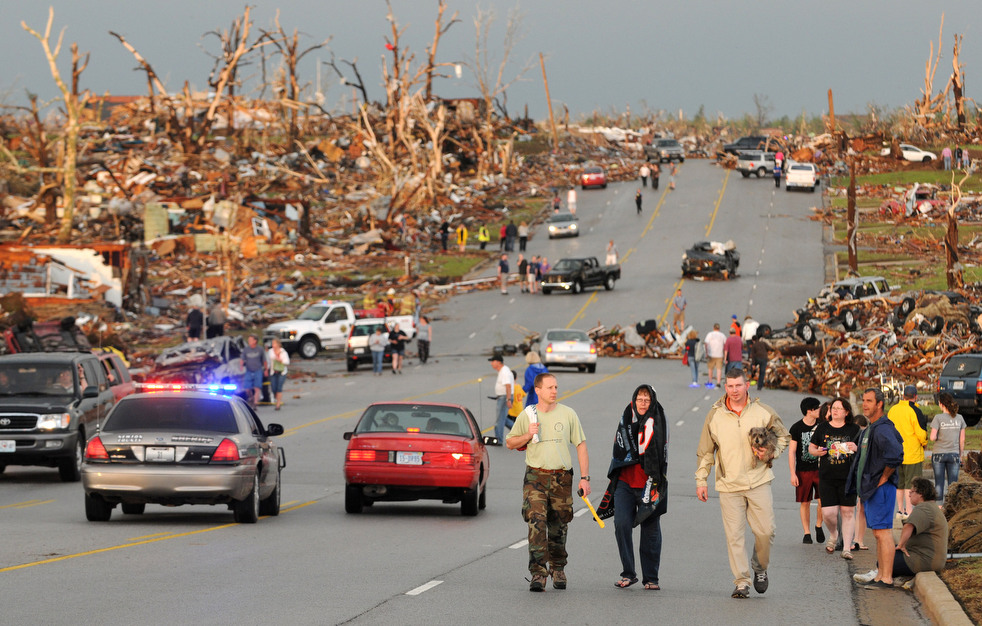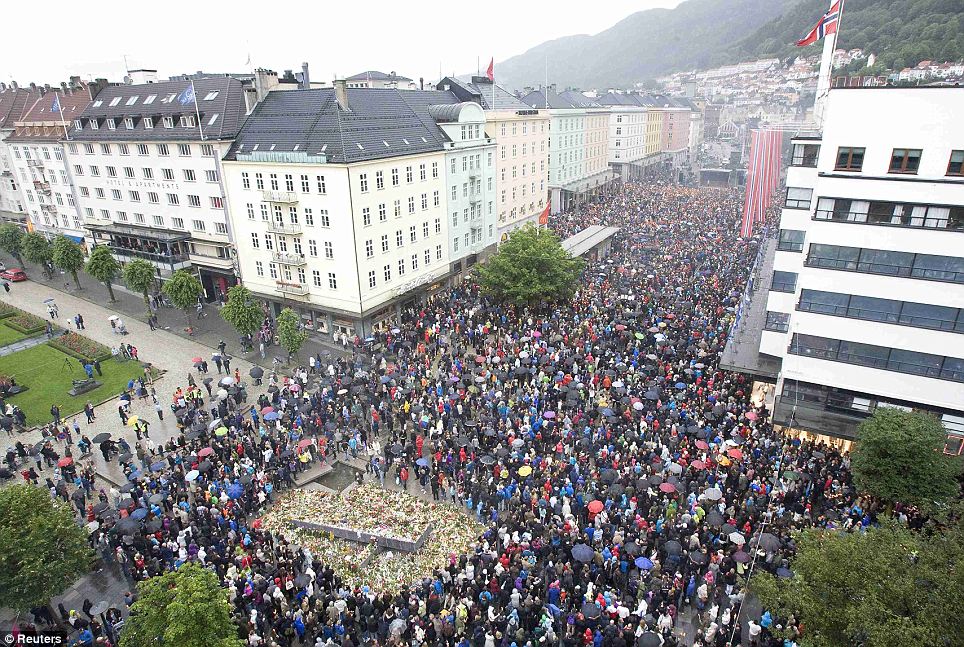In 2011, communities stood up—together—against hate and intolerance. The year began with the outpouring of support after the shooting of U.S. Congresswoman Gabrielle Giffords and was marked by incidents in Elk Grove, Calif., Joplin, Mo., Berea, Ky., Mount Dora, Fla., Jackson, Miss., Concord, N.H., and Norway. Through Project Kesher, 20 cities in the former Soviet Union participated in Not In Our Town activities.
As we embark on the new year, we remember those who stood up for their neighbors. Thank you for helping us stop hate, together.
2011 In January, we remembered those who were killed and wounded in Tucson, Ariz. after an assassination attempt on U.S. Congresswoman Gabrielle Giffords. In this pivotal moment, the majority of Americans grieved together. During this week, in the wake of tragedy, Tucson witnessed—and inspired—an amazing coming-together of people by the tens of thousands. In both grief and solidarity, the people of Tucson hosted vigils and memorials, with cities around the country following suit. They created online groups and organized on-the-ground action. There are angels watching over the families of victims and cyclists whizzing through the streets. Yesterday evening, more than 26,000 attended the public memorial in Tucson at the University of Arizona, including President Obama.
In January, we remembered those who were killed and wounded in Tucson, Ariz. after an assassination attempt on U.S. Congresswoman Gabrielle Giffords. In this pivotal moment, the majority of Americans grieved together. During this week, in the wake of tragedy, Tucson witnessed—and inspired—an amazing coming-together of people by the tens of thousands. In both grief and solidarity, the people of Tucson hosted vigils and memorials, with cities around the country following suit. They created online groups and organized on-the-ground action. There are angels watching over the families of victims and cyclists whizzing through the streets. Yesterday evening, more than 26,000 attended the public memorial in Tucson at the University of Arizona, including President Obama.
Another shooting occurred in March, this time targeting two elderly Sikh men who were walking in Elk Grove, Calif. Residents of multiple faiths came together for a prayer vigil at the intersection of East Stockton Boulevard and Geneva Point Drive, where the two friends were gunned down during their routine afternoon walk. Senate President Pro Tem Darrell Steinberg said that “any attack on one of us is an attack on all of us,” and declared April 13th Sikh Solidarity Day. He urged civic leaders and community members to wear either a man’s turban or a woman’s Punjabi suit and chunni, or headwear, as a symbol of support. The Not In Our Town film crew joined the community at this event. Video forthcoming in 2012.
In the Spring, on NIOT.org, we published two articles about communities committed to tolerance and acceptance. This year marked the 10-year anniversary of the Sept. 11 terrorist attacks in New York. A member of Not In Our Town Princeton addressed hate crimes and discrimination against the Muslim community in the U.S. and finds hope in civil rights organizations, good Samaritans, and interfaith movements.
We reconnected with Project Kesher, whose work we filmed in 2007. We spoke with Project Kesher activist Alina Verhofskaya about adopting the Not In Our Town model in the former Soviet Union.
 In May, insult met injury after Joplin, Mo. was hit with the deadliest tornado on record. The Westboro Baptist Church announced it would protest President Barack Obama's visit to the ravaged town. News of the hate group's visit traveled quickly, sparking people to action. Amid the rubble, people stood in support of this town of 50,000, including the 125 dead and the more than 900 injured. Within hours, Facebook communities popped up, planning how to respond peacefully to the Westboro Baptist Church. At least 18 groups formed, comprised of between five to more than 10,000 people each.
In May, insult met injury after Joplin, Mo. was hit with the deadliest tornado on record. The Westboro Baptist Church announced it would protest President Barack Obama's visit to the ravaged town. News of the hate group's visit traveled quickly, sparking people to action. Amid the rubble, people stood in support of this town of 50,000, including the 125 dead and the more than 900 injured. Within hours, Facebook communities popped up, planning how to respond peacefully to the Westboro Baptist Church. At least 18 groups formed, comprised of between five to more than 10,000 people each.
The apparent racially-motivated killing of a black man in Jackson, Mississippi on June 26 gained national attention after CNN released surveillance video of white teens beating and then running over 49-year-old James Craig Anderson with their pick-up truck. While the footage is shocking, it didn’t surprise all who watched it. Read about how the community rallied after the hate attack.
Graffiti rattled two communities in July. In Berea, Ky. an interracial couple woke one morning to spray-painted racial slurs on their vehicles. "I was angry, but at the same time I knew whoever did it was ignorant," said Damon Dunson, who is black. "They spelled the n-word three different ways," said Melanie Stamper, his girlfriend, who is white. The message left on Stamper's Jeep, she said, told her to get out of the neighborhood. But the couple said that in the aftermath of the incident, people in Berea rallied around them, inviting them to a potluck to discuss discrimination and creating a fund to help pay to repair the vehicles.
Then, in Mount Dora, Fla., a group of four vandals set out on a hate-fueled excursion with spray paint cans in hand. Their target was the Traditional Congregation of Mount Dora, a newly erected synagogue that was scheduled to open in two weeks. Mount Dora residents woke up to a shocking scene. Anti-Semitic graffiti, as well as other hate message and profane slurs, were spray-painted on several structures of the synagogue. While it took police officials weeks to arrest James Maple, 22, two juveniles and a young man, it took community members a mere two hours to react to the hate.
 The Norway killings on July 22 struck an international chord. Children, gathered together because they and their parents believed in building a society where everyone is accepted and respected, were followed to a summer camp and systematically gunned down by a killer who has targeted them because they accept “multiculturalism.” Not In Our Town Executive Producer Patrice O'Neill wrote about what this tragedy means for us Americans, it's connection to the Not In Our Town movement, the Oklahoma City bombings, and Sept. 11.
The Norway killings on July 22 struck an international chord. Children, gathered together because they and their parents believed in building a society where everyone is accepted and respected, were followed to a summer camp and systematically gunned down by a killer who has targeted them because they accept “multiculturalism.” Not In Our Town Executive Producer Patrice O'Neill wrote about what this tragedy means for us Americans, it's connection to the Not In Our Town movement, the Oklahoma City bombings, and Sept. 11.
Like the racist and anti-Semitic graffiti over the summer, hate speech in Concord, N.H. targeted the community's refugee population in September. Residents united immediately in an ongoing effort to show that everyone is welcome and safe in their community.
Similarly, Chattanooga, Tenn. responded to changing demographics and a recent hate crime by sponsoring a hate crime forum with presentations from the FBI, the U.S. Attorney's Office and the Department of Justice Community Relations Service in October. The forum was one of the city's responses to an incident over the July 4 holiday weekend, when three white men drove by a Chattanooga housing project hurling lit fireworks and racial epithets at the predominately African-American residents and their homes.